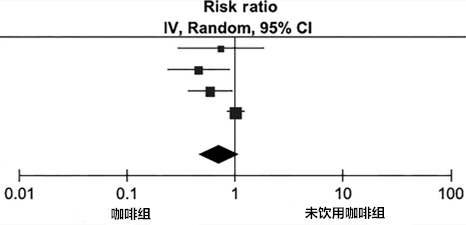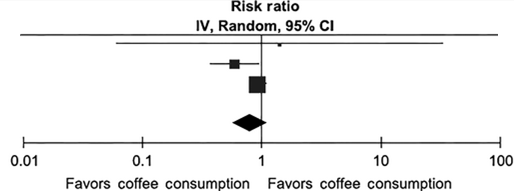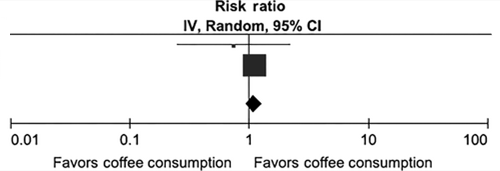Does drinking coffee affect kidney function? The latest medical research indicates that...

For professional baristas, please follow the coffee workshop (Wechat official account cafe_style)
Coffee is a daily drink in Europe and the United States. With the development of globalization, coffee is becoming more and more common in China. But studies have found that coffee is associated with an increased risk of dementia, insulin resistance, type 2 diabetes, liver cirrhosis and osteoporosis, as well as increased frequency and volume of urination. However, the effect of coffee on kidney function is not clear.
Recently, Karn Wijarnpreecha and colleagues at Bassett Medical and Health Center conducted a meta-analysis to assess the correlation between coffee and CKD. The results were published in the journal International Journal of Clinical Practice.
Research review
The researchers screened 2438 articles published in the MEDLINE and EMBASE databases before June 2016 and eventually included 4 studies with 14898 patients. Inclusion criteria: (1) case-control, cross-sectional or cohort studies comparing the risk of CKD between coffee drinkers and non-coffee drinkers; (2) the study data included standardized incidence ratios (SIR) of odds ratio (OR), relative risk (RR), risk ratio (HR) or 95% confidence interval (CI). Inverse variance analysis and random effect analysis were used to analyze the data.
Main results
There was no significant correlation between coffee and CKD, and the total RR was 0.71 (95%CI:0.47-1.08) (figure 1). The statistical heterogeneity is moderate: I2 is 66%. Subgroup analysis (female and male subgroups) showed that there was no significant correlation between coffee and CKD risk in male subgroups. The total RR of female subgroup was 0.81 (95%CI:0.58-1.13), and that of male was 1.10 (95%CI:0.94-1.29) (see figures 2 and 3).

Figure 1 Coffee and CKD risk

Fig. 2 correlation between coffee and CKD risk

Fig. 3 correlation between male coffee and CKD risk
This study is the first meta-analysis to assess the risk of coffee and CKD, and the results show that there is no significant correlation between CKD and coffee. Some researchers believe that coffee can protect renal function and reduce the risk of renal injury, but the specific mechanism is not clear. The possible mechanisms are: coffee contains a variety of ingredients, which can protect glomerular endothelial cells from oxidative stress; coffee can reduce hyperuricemia and delay the progress of CKD; the anti-diabetic effect of coffee helps to prevent the progression of diabetic nephropathy.
Subgroup analysis showed that there was no significant correlation between coffee consumption and CKD in men, which may be due to the limited research data; coffee consumption in women can reduce the risk of CKD, but further research is needed to confirm the potential correlation between coffee and the risk of CKD progression in women.
Translated from Association of coffee consumption and chronic kidney disease: a meta-analysis. Volume 71, Issue 1. January 2017. E12919
Important Notice :
前街咖啡 FrontStreet Coffee has moved to new addredd:
FrontStreet Coffee Address: 315,Donghua East Road,GuangZhou
Tel:020 38364473
- Prev

Can patients with kidney disease still drink coffee? Is there going to be a security problem?
Professional baristas Please pay attention to the Coffee Workshop (Wechat official account cafe_style) Coffee is a daily drink in Europe and the United States. In the United States, more than 1, 2 people drink coffee every day. With the development of globalization, coffee is becoming more and more common in our country. Some studies have found that coffee is associated with dementia, insulin resistance and type 2 glycosuria.
- Next

Why can you concentrate on your work in a noisy coffee shop, but not in a quiet office?
Professional baristas Communication Please follow the Coffee Workshop (Wechat official account cafe_style) I believe many people have the feeling that you can work very attentively in a noisy coffee shop, but it is difficult to do so in an open-plan office. Why on earth did this happen? Research shows that an appropriate level of ambient noise can stimulate our thinking to think more creatively.
Related
- What is the difference between Indonesian Sumatra Mantinin coffee and gold Mantinin? How to distinguish between real and fake golden Mantelin coffee?
- What does bypass mean in coffee? Why can hand-brewed coffee and water make it better?
- Unexpected! Ruixing Telunsu lattes use a smoothie machine to foam milk?!
- % Arabia's first store in Henan opens into the village?! Netizen: Thought it was P's
- Does an authentic standard mocha coffee recipe use chocolate sauce or powder? Mocha Latte/Dirty Coffee/Salty Mocha Coffee Recipe Share!
- What is the difference between Vietnam egg coffee and Norway egg coffee? Hand-brewed single product coffee filter paper filter cloth filter flat solution!
- What is the difference between sun-cured and honey-treated coffee? What are the differences in the flavor characteristics of sun-honey coffee?
- How to make Italian latte! How much milk does a standard latte use/what should the ratio of coffee to milk be?
- How to make butter American/butter latte/butter Dirty coffee? Is hand-brewed coffee good with butter?
- Is Dirty the cold version of Australian White? What is the difference between dirty coffee/decent coffee and Australian white espresso?

